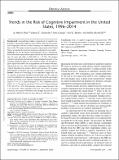Trends in the risk of cognitive impairment in the United States, 1996-2014
Abstract
Background: Accumulating evidence suggests risk of cognitive impairment is declining in high-income countries. Much of this research uses longitudinal surveys in which learning over repeated tests may bias results. We analyze trends in cognitive impairment in the U.S., accounting for prior test experience and selective mortality. Methods: We use the Health and Retirement Study, a population-based, nationally-representative panel dataset and include individuals aged 50 years and older in 1996-2014 (n=32,784). We measure cognitive impairment and dementia using standard cut-points of the modified-Telephone Interview for Cognitive Status. We estimate logistic regression models for any impairment and dementia over time, adjusting for age, gender, and race/ethnicity, and compare models with and without adjustment for practice effects and education. We examine heterogeneity in trends by age, gender, race/ethnicity, and education. Results: Models that did not control for test experience suggest that risk of cognitive impairment and dementia decreased over the study period. Controlling for test experience reverses the trend. In our primary models, prevalence of any cognitive impairment increased for women from 18.7% to 21.2% (annual change 0.7%, 95% confidence interval (CI): 0.1%,1.3%) and for men from 17.6% to 21.0% (annual change 1.0%, CI: 0.5%,1.4%). For dementia, women’s annual increase was 1.7% (CI: 0.8%,2.6%) and men’s 2.0% (CI: 1.0%,2.9%). If not for education, the increase would have been stronger. Increased risk was particularly rapid for Latinas, the least educated, and older ages. Conclusions: Risk of cognitive impairment increased from 1996 to 2014. Uncovering the determinants of increasing cognitive impairment risk should become a research priority.
Citation
Hale , J M , Schneider , D C , Gampe , J , Mehta , N K & Myrskylä , M 2020 , ' Trends in the risk of cognitive impairment in the United States, 1996-2014 ' , Epidemiology , vol. 31 , no. 5 , pp. 745-754 . https://doi.org/10.1097/EDE.0000000000001219
Publication
Epidemiology
Status
Peer reviewed
ISSN
1044-3983Type
Journal article
Description
Dr. Neil K. Mehta received support from U.S. National Institute on Aging (R03AG060404 and 2T32AG027708-06A1)Collections
Items in the St Andrews Research Repository are protected by copyright, with all rights reserved, unless otherwise indicated.

